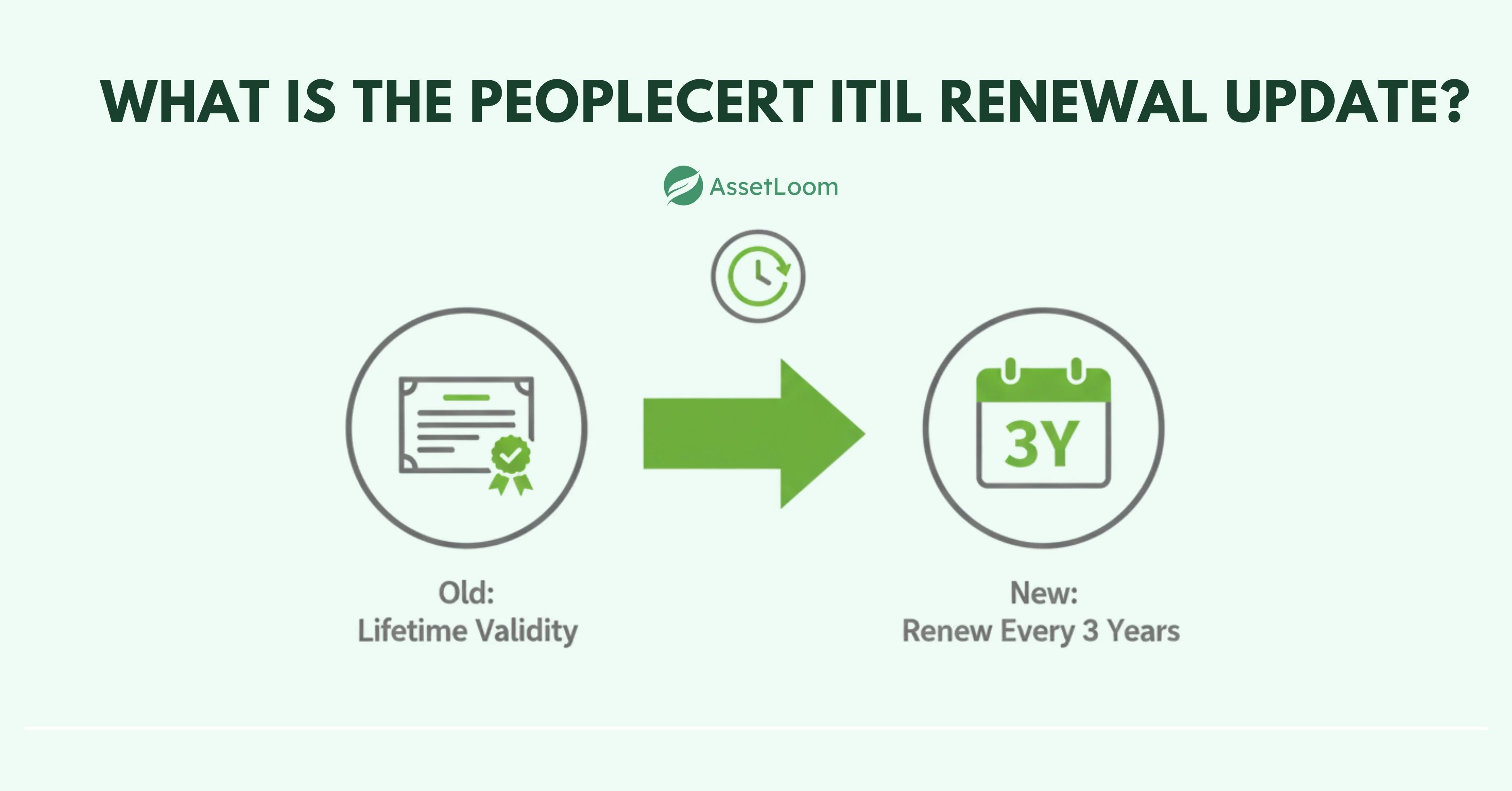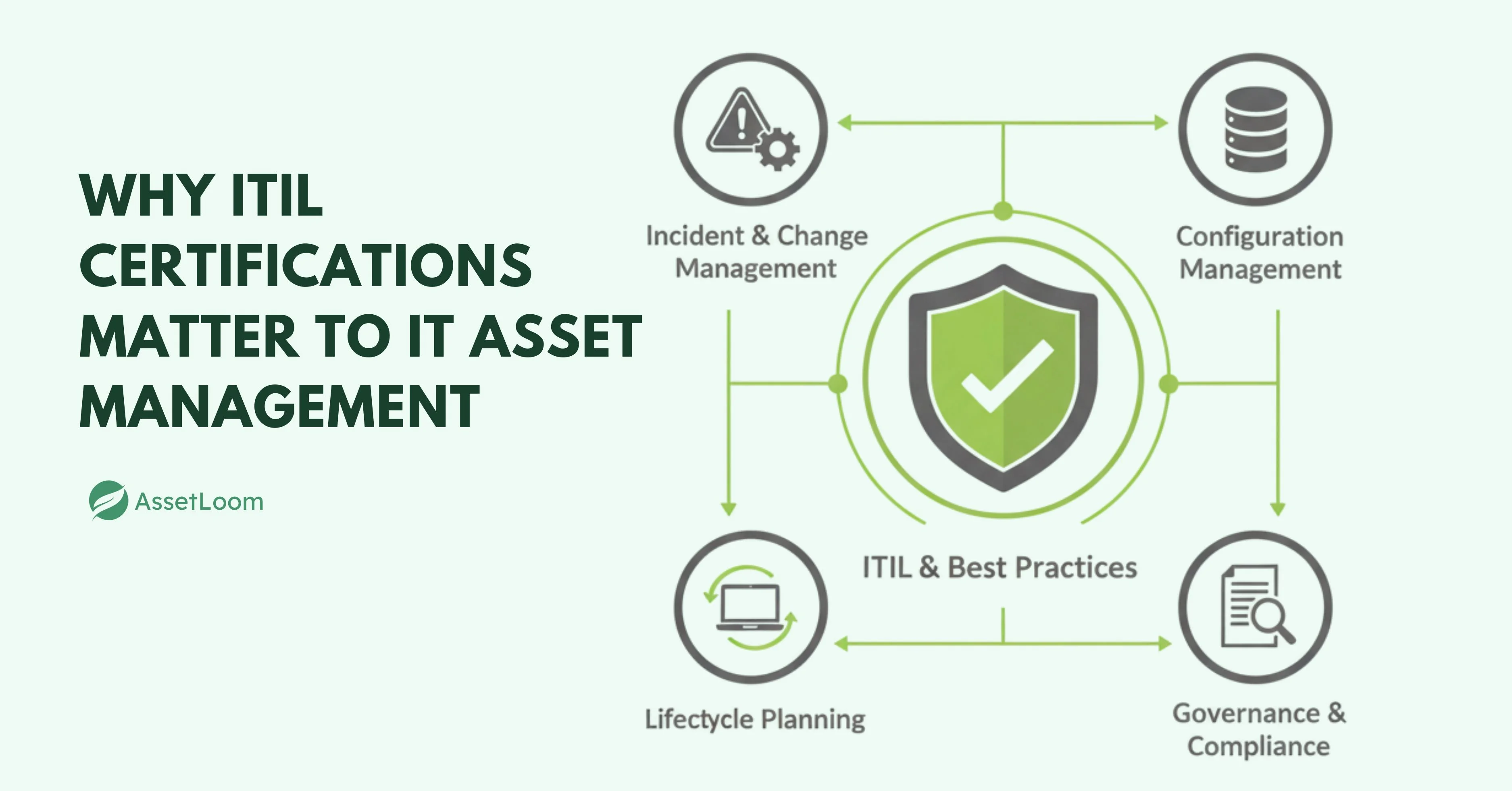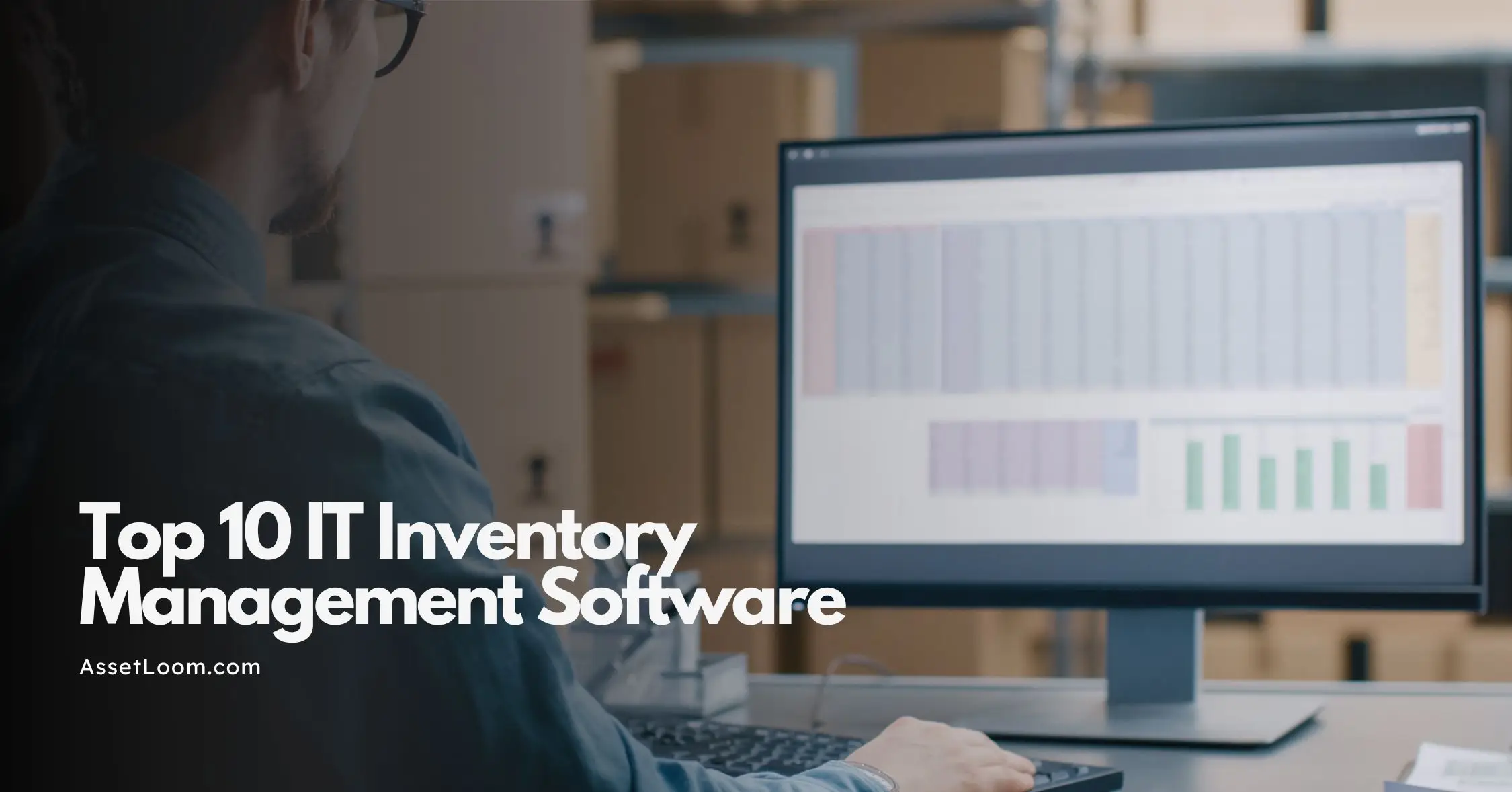PeopleCert ITIL Renewal Update for IT Asset Managers
Find out how the PeopleCert ITIL renewal update affects certifications, expiration dates, and what IT Asset Managers need to do to stay compliant.
For years, ITIL certifications have been considered a gold standard in IT service management. They give professionals a common framework for managing services, processes, and assets. Recently, PeopleCert announced an important change: all ITIL certifications now need to be renewed every three years.
On the surface, this might sound like a simple update for service managers, but it also affects IT Asset Managers. ITIL and ITAM are closely connected. Service performance depends on reliable assets, and asset decisions often follow ITIL practices.
The new renewal policy adds some pressure. Teams will need to plan for training costs, schedule renewals on time, and make sure staff knowledge doesn’t expire along with the certificates. For IT Asset Managers, the change is more than an administrative task — it has a real impact on how work is planned and managed.
What Is the PeopleCert ITIL Renewal Update?
In 2023, PeopleCert announced that ITIL certifications would no longer last for life. Instead, every ITIL certification now needs to be renewed every three years. This change applies to all levels, from ITIL Foundation up to advanced modules.

Before this update, once you passed an ITIL exam, the certification stayed valid indefinitely. Many professionals built their careers on that model. The new approach is different. To keep a certification active, you now have a few options:
- Retake the exam before the three-year mark.
- Earn and log continuing professional development (CPD) points through training or learning activities.
- Take another course or a higher-level ITIL exam within the renewal period.
The goal behind this change is to make sure ITIL knowledge stays up to date. Frameworks evolve, new practices are added, and service management doesn’t stand still. By introducing renewals, PeopleCert wants professionals to keep learning and adapting rather than relying on knowledge that might be outdated.
For IT Asset Managers, this creates a practical challenge: the rules of certification have shifted, and organizations need to adjust how they plan around it.
Why ITIL Certifications Matter to IT Asset Management
ITIL is often viewed mainly as a service management framework, but its influence goes beyond that. Many of the processes described in ITIL overlap with the daily work of IT Asset Managers.

For example:
- Incident and Change Management – Asset data is critical when handling incidents or planning changes. If a server goes down, you need accurate records of where it sits, what software it runs, and who uses it.
- Configuration Management – The CMDB (Configuration Management Database) depends on reliable asset records. ITAM feeds this data.
- Lifecycle Planning – ITIL practices for service strategy and transition align with asset lifecycle decisions such as procurement, upgrades, and retirement.
- Governance and Compliance – ITIL highlights the importance of structured processes, which support ITAM in managing audits, licenses, and regulatory requirements.
This connection means that when ITIL standards shift, ITAM doesn’t stand still either. A certified workforce ensures ITAM teams can align with IT service goals, speak the same “language” as ITSM colleagues, and make decisions based on shared frameworks.
With renewal now part of the picture, ITAM professionals who hold ITIL certifications must stay prepared. The knowledge gap created by an expired certification could affect both individual careers and organizational processes.
Read also: IT Asset Management Certifications That Employers Look For
What ITIL certifications will need to be renewed?
PeopleCert has stated that all of its Business and IT certifications must now be renewed within three years of the original certification date. The list includes:
- ITIL® 4
- PRINCE2® 7, 5th and 6th
- PRINCE2® Agile
- MSP® 4th and 5th
- M_o_R® 3rd and 4th
- MoP®
- P3O®
- MoV®
- AgileSHIFT®
- RESILIA®
One exception is ITIL v3 certifications. These do not need to be renewed, though many professionals still choose to upgrade to ITIL 4 to keep their knowledge aligned with current practices.
For IT Asset Managers, ITIL 4 is the main focus, since it has the closest ties to asset lifecycle, service delivery, and governance.
When does my ITIL certification expire?
Your ITIL certification is valid for three years from the date you earned it. After that, it needs to be renewed. If you don’t renew, the certification is no longer considered current, which can be a problem if ITIL knowledge is important for your role or career progression.
PeopleCert gives you a few ways to renew:
- Retake the exam for the certification you already hold.
- Earn credits by completing other courses in the portfolio.
- Join the CPD (Continuing Professional Development) program and collect points through learning activities.
These options are designed to keep professionals updated with the latest IT service management practices and ensure skills remain relevant.
How can certifications be renewed?
PeopleCert provides several ways to keep an ITIL certification valid beyond the three-year mark. You can choose the option that best fits your career goals and learning style:
-
**Retake the same exam: **Sit for the same certification exam again before it expires. Passing it will extend your certification for another three years.
-
**Take another course or higher-level exam: **Moving up in the ITIL path also renews your earlier certifications. For example, completing an ITIL Managing Professional module can refresh your ITIL Foundation certification as well.
-
**Join the CPD (Continuing Professional Development) program: **By subscribing to PeopleCert’s CPD program, you can log learning activities and collect CPD points each year. Meeting the required number of points keeps your certification active.
Each pathway has different costs and time commitments, but all of them make sure your knowledge stays aligned with current ITIL guidance.
ITIL certification alternatives
While ITIL is one of the most widely recognized frameworks in IT service management, it’s not the only option. Some IT Asset Managers and ITSM professionals may find that other certifications better match their role, budget, or career goals.
Here are a few alternatives worth considering:
- **COBIT (Control Objectives for Information and Related Technologies): **Focuses on governance and management of enterprise IT. Useful for professionals dealing with compliance, audit, and strategic IT management.
- **ISO/IEC 20000 Certification: **An international standard for IT service management. It provides a formal approach for organizations that want to demonstrate compliance rather than individuals seeking personal certification.
- **FitSM: **A lightweight service management standard that offers training and certification. Easier to adopt for organizations that want structure without the full depth of ITIL.
- **HDI Certifications: **Targeted at service desk and support center roles. More practical for those focused on day-to-day service operations.
- **DevOps Foundation and SRE (Site Reliability Engineering) Certifications: **Centered on modern service delivery approaches, automation, and continuous improvement. Often chosen by teams working in cloud or agile environments.
These alternatives don’t replace ITIL for everyone, but they can complement IT asset management practices or provide a different perspective on managing IT services and assets.
The Bigger Picture: ITIL Renewal as an Opportunity
It’s easy to see the renewal requirement as just another obligation, but it can also be viewed as a chance to strengthen ITAM practices. Certifications that never expired often meant people stopped updating their knowledge once they passed the exam. Now, the cycle of renewal pushes professionals to stay connected to current practices.
For IT Asset Managers, this creates a few opportunities:
- Closer alignment with ITSM – Renewal encourages teams to stay familiar with the latest ITIL guidance, making it easier for ITAM and ITSM to work together.
- Modernized processes – New ITIL updates reflect changes in technology, cloud services, and agile ways of working. By keeping certifications active, ITAM teams can adopt improvements that make daily work smoother.
- Culture of continuous growth – Regular training and renewal show that learning is not a one-time task. This mindset can spread across teams, improving how people approach both service and asset management.
Instead of treating the renewal policy as a burden, ITAM leaders can use it to refresh skills, update processes, and build stronger collaboration with service management.
Frequently Asked Questions (FAQs)
1. When does my ITIL certification expire? ITIL certifications are valid for three years from the date you earn them. After that, they must be renewed to stay current.
2. Do ITIL v3 certifications need to be renewed? No. ITIL v3 certifications remain valid for life. However, many professionals choose to upgrade to ITIL 4 to align with modern practices.
3. How can I renew my ITIL certification? You can retake the same exam, complete another ITIL course or higher-level module, or join the PeopleCert CPD program to collect points through ongoing learning activities.
4. Which certifications are covered by the renewal policy? The renewal requirement applies to ITIL 4 and other PeopleCert certifications such as PRINCE2, MSP, MoP, and AgileSHIFT.
5. What happens if I don’t renew my ITIL certification? Your certification will no longer be recognized as current. It will still appear in the PeopleCert system, but marked as expired, which could affect job opportunities or compliance requirements.
6. How does this impact IT Asset Managers? Since ITIL and ITAM are closely connected, expired certifications could create gaps in knowledge and alignment. Renewal ensures ITAM professionals stay in sync with ITSM practices.
7. Are there alternatives to ITIL certifications? Yes. Options include COBIT, ISO/IEC 20000, FitSM, HDI, and DevOps/SRE certifications. These can complement ITAM practices or offer different approaches to service management.

Related Blogs
Subscribe for Expert Tips and Updates
Receive the latest news from AssetLoom. right in your inbox


